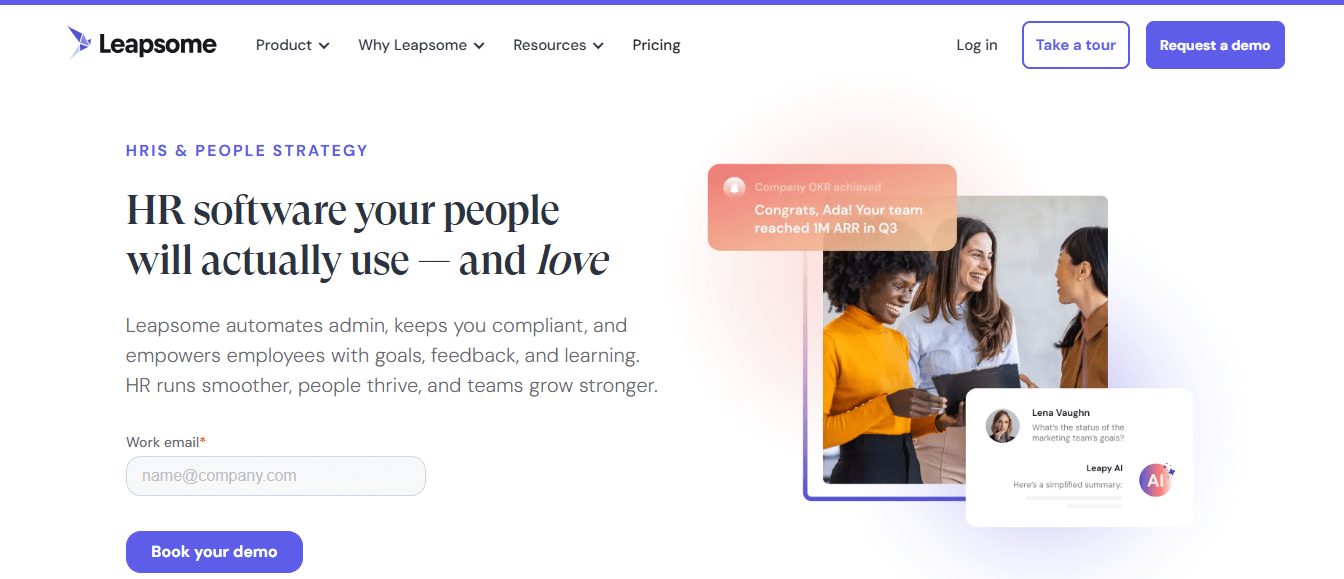Workday has long been a trusted name in HR and finance management, but growing frustration among users has led workers to find better options. From online reviews, many businesses and employees complain about its clunky interface, complex customization, and poor user experience especially within its recruiting module. Candidates find the application process tedious, while HR teams cite high implementation costs and limited flexibility. As organizations seek more agile, intuitive, and cost-effective platforms, several affordable alternatives deliver similar or greater functionality without the headaches. In this article, we’ll explore the Top 10 Best Affordable Workday Alternatives that help companies manage their people and processes.
Top 10 Best Affordable Workday Alternatives
1. Gusto
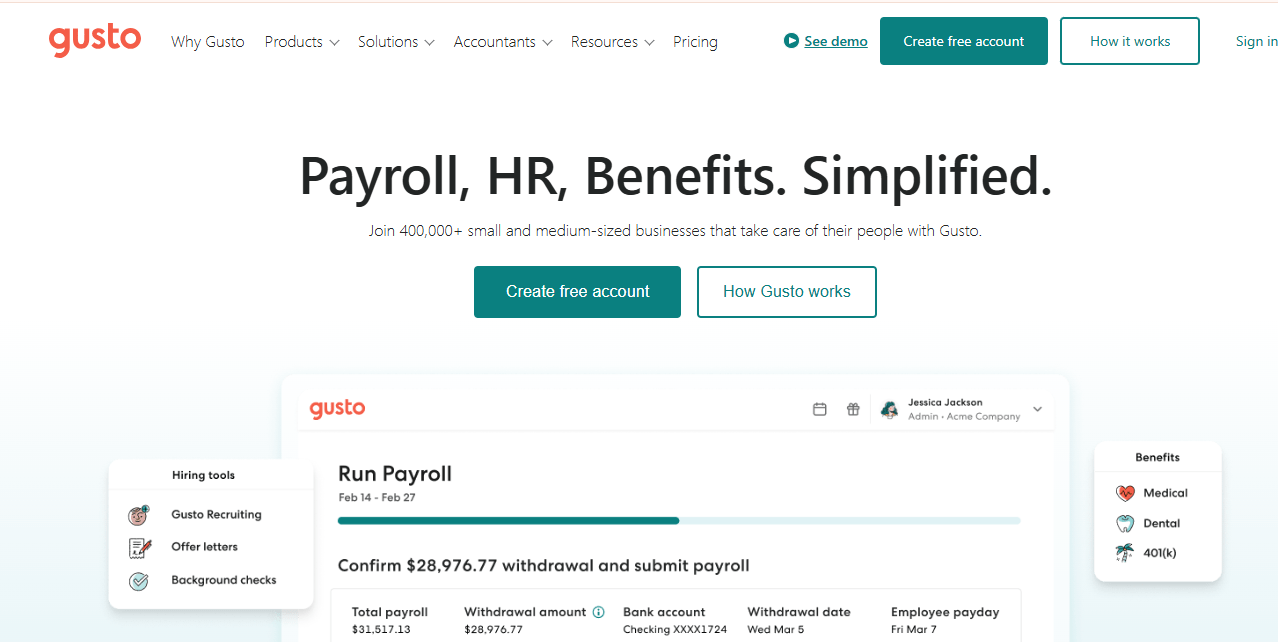
Gusto is a cloud-based platform that helps small and mid-sized businesses handle payroll, benefits, and HR tasks. It manages payroll calculations, tax filings, employee onboarding, and benefits administration. The software makes these processes simple and accessible, focusing on straightforward payroll and benefits management without the complexity of enterprise-level tools like Workday. Users appreciate its easy-to-use interface and automation of repetitive tasks.
Features
- Automates payroll for salaried, hourly, and contract workers while calculating deductions, taxes, and net pay.
- Supports direct deposit, checks, and payments through the Gusto Wallet app for flexible employee access to earnings.
- Manages payroll for businesses operating in multiple states and supports international payroll in over 100 countries through Gusto Global.
- Offers employee benefits such as health, dental, vision, 401(k) retirement plans, commuter benefits, and customizable options like wellness stipends or life insurance.
Pros
- Automates payroll and tax filing
- Includes a self-service employee portal
- Combines payroll, benefits, and HR tools in one system
- Easy-to-navigate interface
Cons
- Customer support can be slow
- The basic plan has limited features
Pricing
- Simple: $24.50/month
- Plus: $40/month
- Premium: $90/month
Best For
Small to mid-sized businesses seeking an easy-to-use payroll and HR solution without enterprise-level complexity.
2. Deel
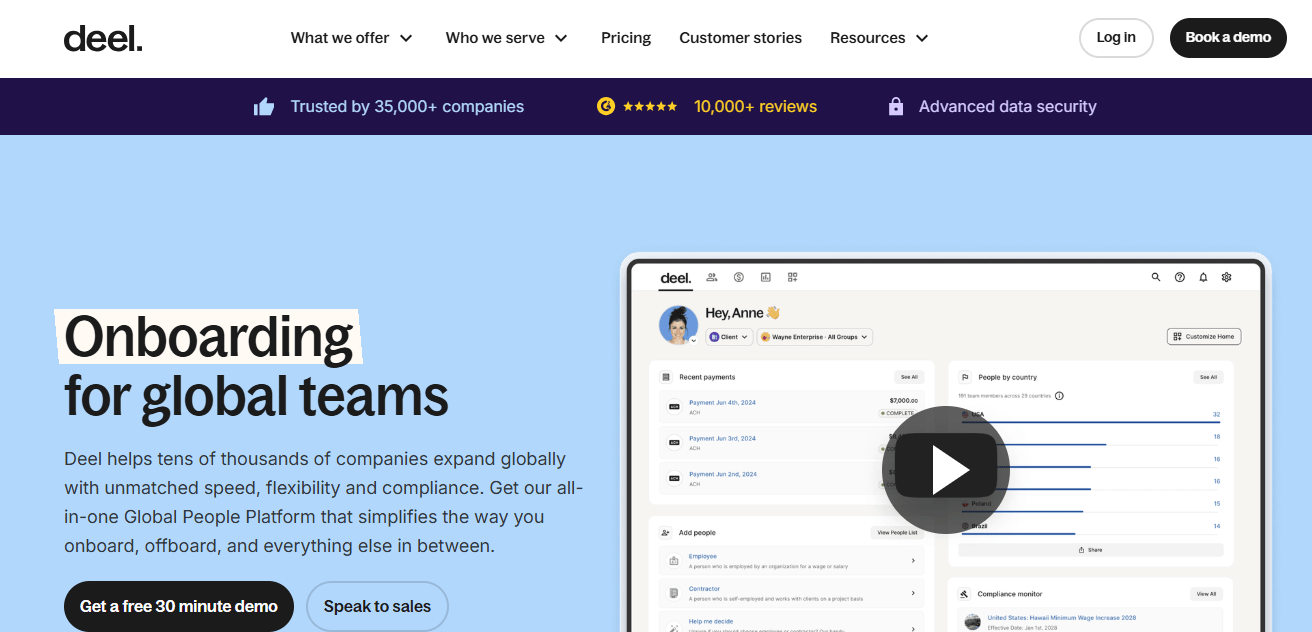
Deel Software helps companies manage global HR and payroll through a single platform. It ensures compliance in more than 150 countries and automates key tasks like onboarding, payments, and regulatory reporting. Businesses can hire employees or contractors anywhere in the world within minutes while keeping HR processes organized and accurate.
Features
- Manage payroll for employees and contractors across multiple countries
- Automate onboarding and contract creation
- Support equity, bonuses, pensions, and vacation tracking
- Track global compliance requirements through a central hub
- Provide performance management tools
- Offer immigration and visa support
- Integrate with accounting and reporting software
Pros
- Simplifies paying international employees and contractors
- Handles immigration and visa processes in 25 countries
- Responsive customer support team
- Reduces administrative burden for HR tasks such as performance reviews, expense tracking, and time-off management
Cons
- Requires internet connectivity; offline use is limited
- Can take time for teams to adjust if they previously managed global operations manually
Pricing
- Deel Employer of Record (EOR): $599 per employee/month
- Deel US Payroll: $19 per employee/month
- Deel Contractor Management: $49 per month
Best For
Businesses looking to manage global payroll and hire remote employees efficiently.
3. BambooHR
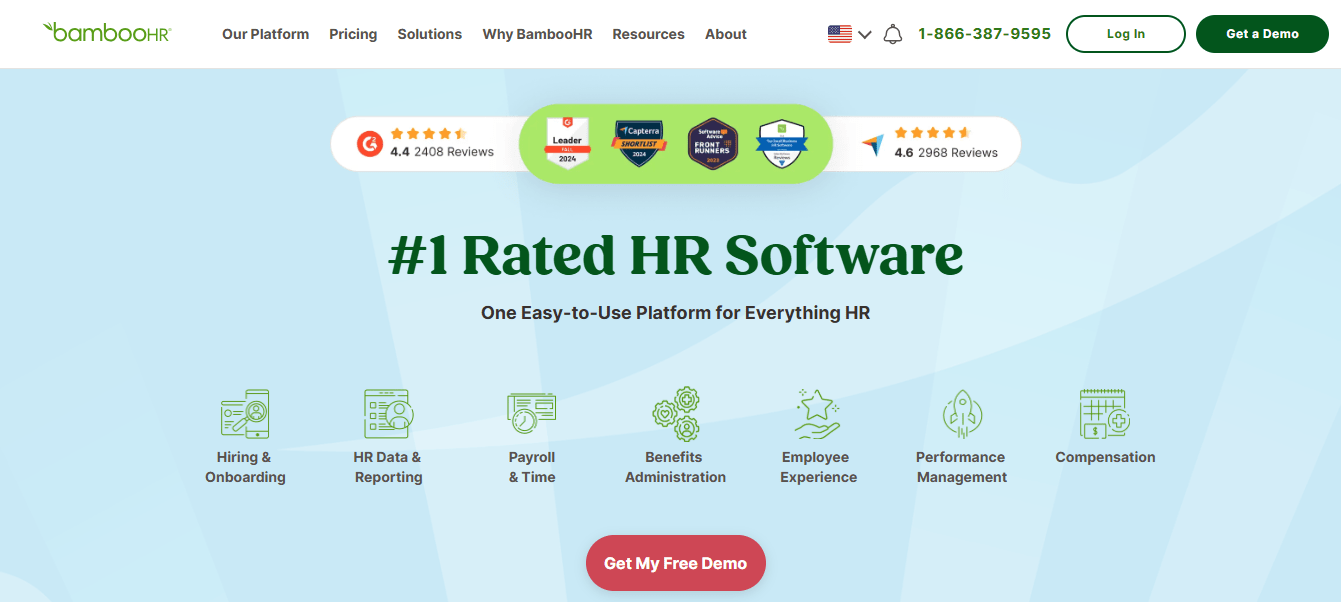
BambooHR helps businesses manage employee information and HR tasks in one system. HR teams can store and access personal details, employment history, and important documents all in a single location. The platform also supports recruitment and onboarding by managing job postings, tracking applicants, and handling digital document signing. Additionally, BambooHR tracks employee hours, absences, and leave requests to help managers monitor workforce activity.
Features
- Employee data management: Store and organize employee information in one place.
- Applicant tracking system (ATS): Manage job postings, applications, and candidate communications efficiently.
- Time-off management: Record leave and time-off requests, approve them digitally, and keep accurate attendance records.
- Performance management: Conduct employee evaluations, set goals, and provide ongoing feedback.
- Onboarding tools: Automate paperwork and guide new hires through the integration process.
- Employee self-service: Let employees update personal details and track their benefits independently.
Pros
- Easy-to-use interface with simple navigation
- Covers essential HR functions
- Strong self-service options for employees
- Flexible reporting and analytics
Cons
- Pricing is not listed upfront
- Can be expensive for very small businesses
- Payroll functionality is limited without extra add-ons
- Some advanced features require upgrades
Pricing
Contact BambooHR for details
Best For
Companies with up to 350 employees that want accessible HR software with essential features and reporting tools
4. Paylocity
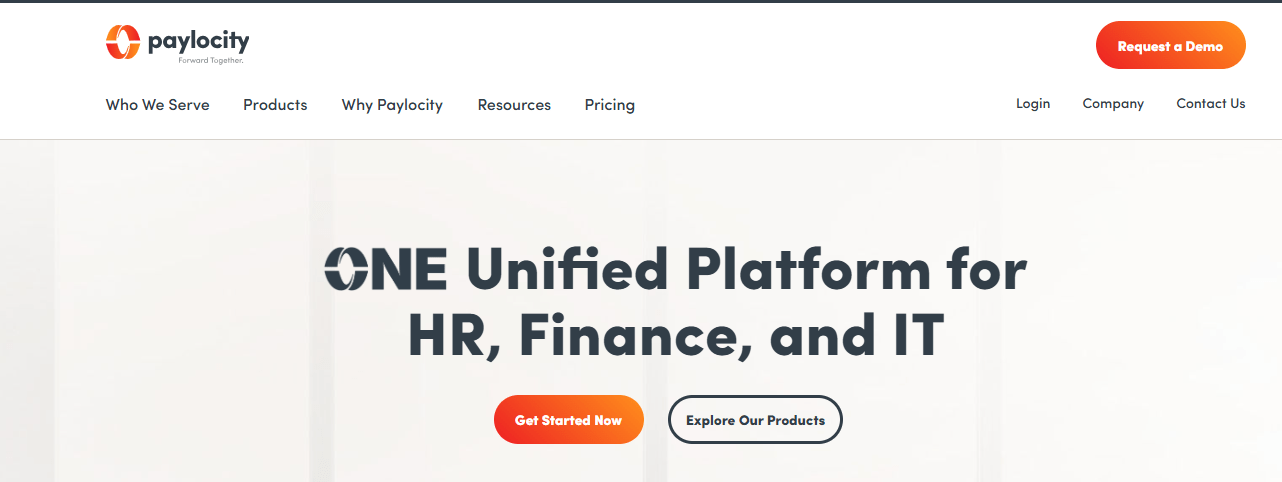
Paylocity is a cloud-based HR and payroll platform that allows businesses to manage the full employee lifecycle. It targets mid-market companies and prioritizes employee engagement. Unlike Workday, which focuses on large enterprises, Paylocity encourages internal communication and collaboration through a community platform. It also includes peer-to-peer recognition and automated surveys to monitor employee satisfaction.
Features
- Employee Onboarding: Automates paperwork, tracks progress, and helps new hires get up to speed quickly.
- Workforce Management: Schedules shifts, monitors attendance, and manages time-off requests efficiently.
- Talent Management: Supports recruiting, succession planning, and skill tracking to help retain top talent.
- Learning Management: Delivers training courses, tracks employee progress, and ensures compliance with certifications.
- Compliance Tracking: Helps maintain legal compliance with labor laws, payroll regulations, and reporting requirements.
- HR Analytics: Offers insights into workforce trends, turnover rates, and performance metrics.
Pros
- Supports global payroll and on-demand payments
- Provides benefits and tax services
- Combines talent and performance management
Cons
- Initial setup can take time
- Does not support independent contractor management
Pricing
Available upon request
Best For
Companies seeking core HR functionality with tools for improving employee engagement.
5. Rippling
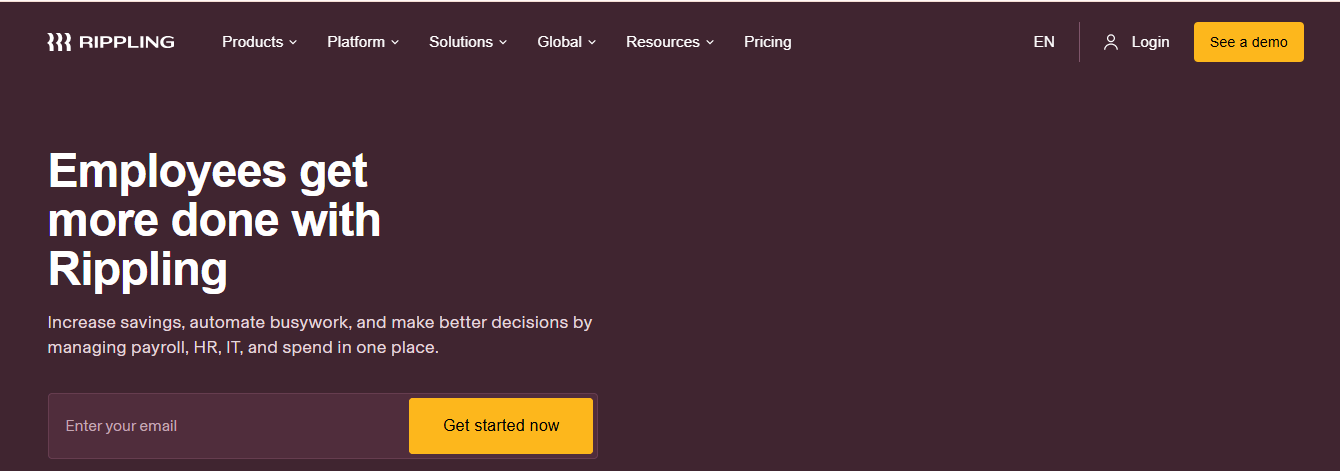
Rippling combines HR, IT, payroll, and spend management into one platform that manages the entire employee lifecycle, from hiring to benefits administration. It automates HR tasks, keeps your business compliant, and simplifies approval processes. Rippling also manages devices, controls software access, monitors compliance, handles payroll, provides real-time financial visibility, and enforces spending policies—all from a single dashboard.
Features
- Time clock: Track employee hours with a one-click time clock, generate timesheets automatically, and approve them for payroll.
- Scheduling: Create employee schedules using a drag-and-drop tool that automatically flags overtime and compliance issues.
- Automated workflows: Set up no-code workflows triggered by data from Rippling or connected software.
- Employee training: Assign pre-made or custom training courses and include training time in employee schedules.
- Custom reports: Use pre-made reports or build your own with filters and formulas to analyze your business data.
Pros
- The interface is intuitive and easy to navigate.
- The platform scales easily to support growing teams.
- Automation of administrative tasks saves time and reduces errors.
Cons
- Customer support can be slow when handling complex issues.
- New users may face a steep learning curve due to its many features.
Pricing
Available upon request
Best for
Businesses seeking a single platform for integrated HR management.
6. ADP Workforce Now

ADP Workforce Now combines payroll, benefits management, time tracking, compliance, and other HR tasks into a single platform. It allows businesses to handle HR operations from one central system, making daily tasks easier. ADP serves companies of all sizes, from small startups to large enterprises, and provides a viable alternative to Workday thanks to its broad functionality and scalability.
Features
- Payroll: Calculates and processes paychecks, manages tax withholdings and deductions, automates payroll tasks, and reduces errors and compliance risks.
- Time and Attendance: Tracks employee hours, manages time-off requests, and supports multiple time capture methods, including web-based, biometric, and mobile tracking.
- Performance Management: Helps set goals, track employee progress, provide ongoing feedback, and use performance data to recognize top performers or guide promotions.
- Employee Self-Service: Allows employees to update personal information, view pay statements and tax forms, and request time off through the mobile portal, reducing HR workload and improving employee control.
Pros
- Integrates with major job boards for effective recruiting.
- Offers a user-friendly self-service portal for employees.
- Simplifies payroll with automated processing and alerts to prevent errors.
Cons
- Advanced HR functions require additional add-ons, which may raise costs.
- Performance management features feel scattered and less unified.
- Offers limited customization for workflows and reporting.
Pricing
Available upon request
Best For
Companies seeking comprehensive payroll and HR management tools.
7. Paycom
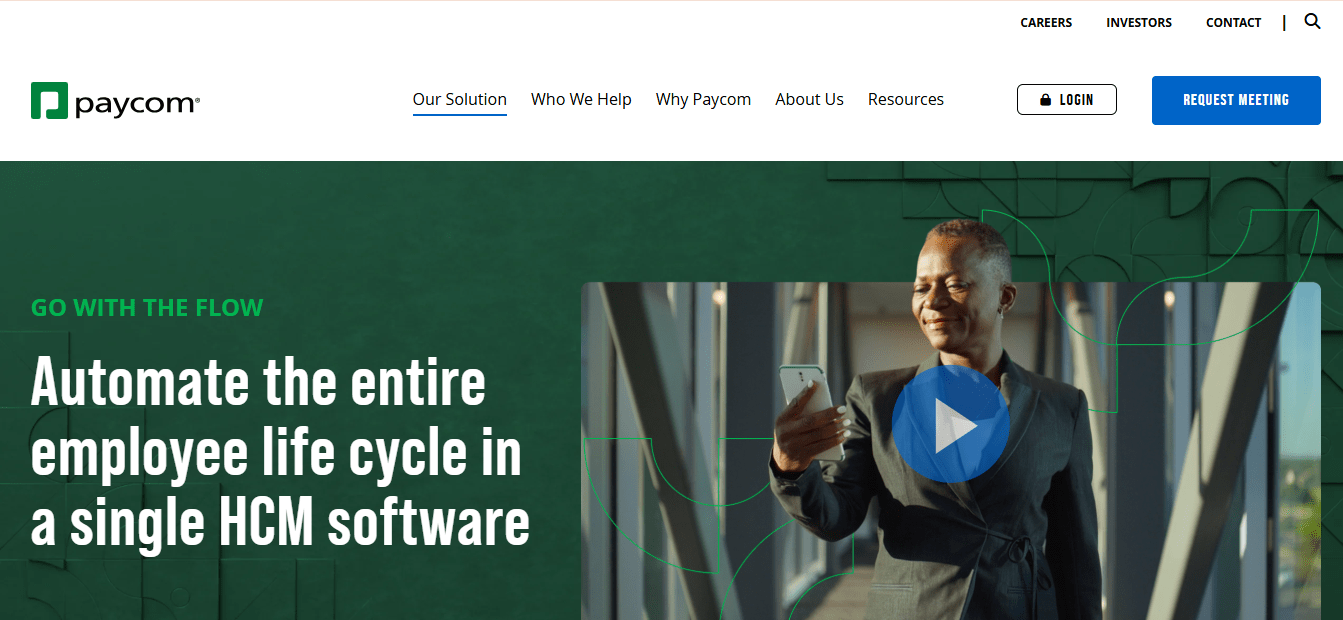
Paycom stands out for its single database design. Unlike many HR platforms that rely on multiple databases or third-party integrations, Paycom keeps all employee data in one place. This reduces errors and removes the need for duplicate data entry. HR teams experience a consistent and reliable system, improving both data accuracy and operational workflow.
Paycom offers a full suite of HR tools that cover the entire employee lifecycle. From hiring and onboarding to payroll, time tracking, benefits management, and performance reviews, every module exists within the platform. Businesses can manage HR functions without purchasing or connecting separate systems.
Features
- Payroll Processing: Automates payroll tasks, handles taxes, deductions, direct deposits, garnishments, and payroll expenses. Supports flexible pay options like pay cards and daily pay, and generates general ledger reports ready for import.
- Time and Labor Management: Tracks employee hours, schedules, time-off requests, and labor costs. Includes automated scheduling, accurate time clocks, and labor allocation tracking for better workforce oversight.
- Talent Acquisition: Manages job postings, applicant tracking, background checks, and electronic onboarding. Automatically posts positions on your website, major job boards, and career sites while integrating candidate data across the platform.
- HR Management: Centralizes employee records, benefits administration, and compliance tracking. Provides self-service options for employees, automates routine HR tasks, and delivers customizable reports.
Pros
- Intuitive and easy-to-use interface improves productivity.
- Covers all key HR functions in one system.
- Simplifies complex payroll processes with clear and accurate tools.
Cons
- Initial setup may require significant time and effort.
- Some modules may have limited customization compared to other platforms.
- Customer support response can be slow at times.
Pricing
Paycom pricing varies depending on the organization size and feature requirements.
Best For
Companies seeking a fully integrated HR solution that manages all employee processes in one platform.
8. UKG
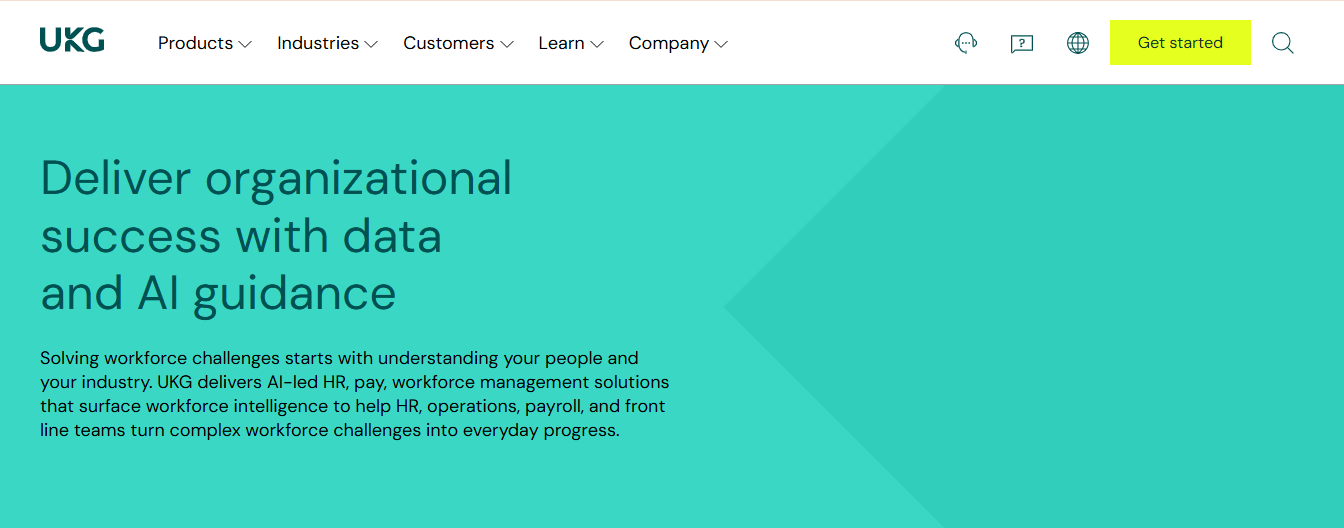
UKG provides HR, payroll, and workforce management solutions that help organizations manage their employees efficiently. Organizations choose UKG for its complete suite of tools that address a wide variety of HR and workforce needs. Its focus on both employee management and operational workflows positions it as a strong alternative to Workday for companies seeking an all-in-one solution.
Features
- HR Management: Securely store employee data, manage company policies, and distribute the employee handbook from a single platform.
- Benefits: Set up and administer health insurance, life insurance, 401(k), and other employee benefits.
- Time Tracking: Track employee hours, attendance, overtime, and time-off requests.
- Job Scheduling: Build work schedules based on employee skills, preferences, and labor law compliance.
- Payroll: Process payroll, handle taxes and deductions, and provide employees with access to paystubs and W2 forms.
Pros
- Provides a complete HR and payroll solution in one platform
- Offers a mobile app for access from anywhere
- Includes advanced reporting and analytics
Cons
- Requires time to learn and adapt to the system
- Setup process is long and complex
- More expensive than some alternatives
Pricing
Available upon request
Best For
Organizations seeking a comprehensive workforce management solution.
9. Lattice
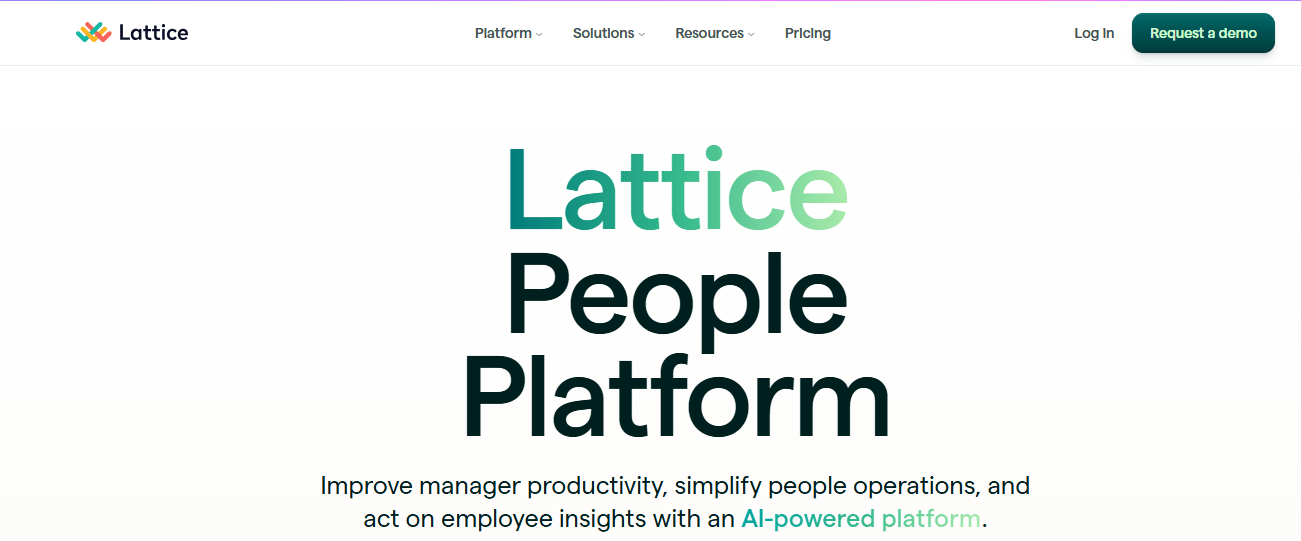
Lattice is a people management platform that helps businesses align individual and team goals with company objectives. It’s especially effective for HR teams in fast-growing startups and mid-sized companies seeking to improve engagement, performance, and accountability. The platform promotes a culture of ongoing feedback and development by giving employees and managers the tools they need to track progress, share insights, and grow together.
Features
- Performance Reviews: Create structured review cycles that provide clear feedback and track progress.
- Goal Management: Set and monitor OKRs to ensure team goals support company objectives, all visible on real-time dashboards.
- Continuous Feedback: Encourage frequent check-ins and peer recognition to build a culture of open communication.
- Engagement Surveys: Use customizable surveys to measure morale and get insights into team satisfaction.
- Analytics and Insights: Access simple, data-driven reports through an intuitive interface that’s easy for HR teams and managers to navigate.
Pros
- Clean, user-friendly interface that’s easy to navigate
- Promotes consistent communication and feedback
- Helps align employee performance with organizational goals
Cons
- May experience occasional delays during data tracking
- Teams might require an adjustment period to learn all tools
- The setup process can take some time for first-time users
Pricing
- HRIS: $10 per user/month
- Talent Management: $11 per user/month
Best For
Startups and mid-sized companies aiming to strengthen performance management, improve feedback culture, and maintain clear goal alignment within their teams.
10. Leapsome
